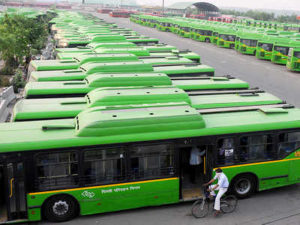 Delhi Transport Corporation, which has 3,882 buses, transports around 3.1 million passengers every day, while the 1,789 buses operating under the cluster scheme carry 1.2 million. The DTC fleet will be augmented with 1,000 new CNG buses in 2019-20, while the cluster scheme will get 1,000 standard-floor CNG buses and 1,000 low-floor AC CNG buses. 1,000 low-floor AC electric buses are also expected to be added.
Delhi Transport Corporation, which has 3,882 buses, transports around 3.1 million passengers every day, while the 1,789 buses operating under the cluster scheme carry 1.2 million. The DTC fleet will be augmented with 1,000 new CNG buses in 2019-20, while the cluster scheme will get 1,000 standard-floor CNG buses and 1,000 low-floor AC CNG buses. 1,000 low-floor AC electric buses are also expected to be added.
In addition, and making a step towards adding accesibility to public transport, the Delhi cabinet on Friday also approved the installation of hydraulic lifts in 1,000 standard floor CNG buses in the city. The cost will be reimbursed to the concessionaires.
"Sufficient modes of public transport are the only way to reduce air pollution in Delhi and bring down the number of vehicles on the roads to reduce congestion," the government said in a statement.
The focus of the budget relating to transport was on creating transport infrastructure in the city. The estimated investment reaches 255 million USD, in 2019-20, which the government said was nearly double that in 2018-19.
“Vehicles contribute to approximately 40% emission of PM 2.5 in Delhi. The investment in buses and infrastructure aims to resolve this problem.
The budget also allocated funds for construction and renovation of bus depots, bus terminals and bus queue shelters. The proposal for the constructionof six new bus depots at Ghumanhera, Mundela Kalan, Rohini, East Vinod Nagar, Bawana and VIU Burari have been approved and these could be made functional next year, Sisodia said. New bus depots at Daurala, Kapashera, Bamnauli, Sarai Kale Khan and Narela will also be constructed.
Apart from bus depots, new bus terminals will also be erected in Sectors 4 and 12 of Dwarka, Vikaspuri and Narela. The ones located in Nehru Place, Azadpur, Najafgarh and Central Secretariat will be renovated.
